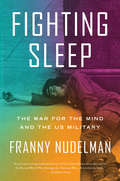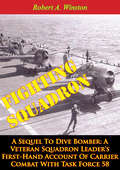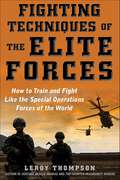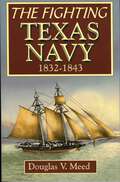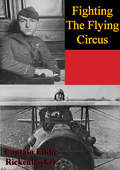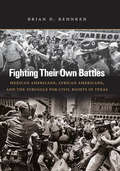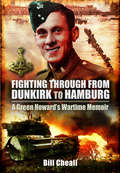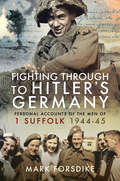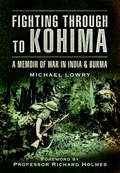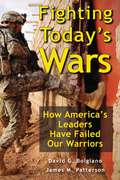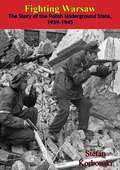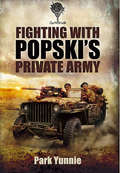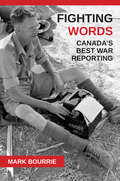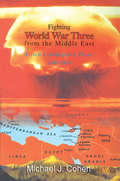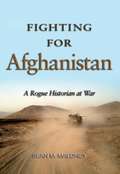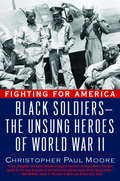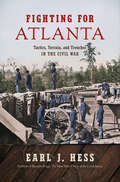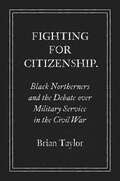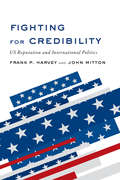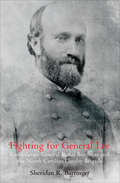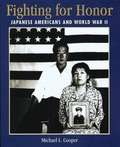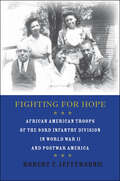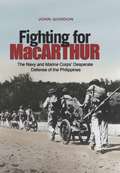- Table View
- List View
Fighting Sleep: The War for the Mind and the US Military
by Franny NudelmanHow the military used sleep as a weapon—and how soldiers fought backOn April 21, 1971, hundreds of Vietnam veterans fell asleep on the National Mall, wondering whether they would be arrested by daybreak. Veterans had fought the courts for the right to sleep in public while demonstrating against the war. When the Supreme Court denied their petition, they decided to break the law and turned sleep into a form of direct action. During and after the Second World War, military psychiatrists used sleep therapies to treat an epidemic of “combat fatigue.” Inducing deep and twilight sleep in clinical settings, they studied the effects of war violence on the mind and developed the techniques of brainwashing that would weaponize both memory and sleep. In the Vietnam War era, radical veterans reclaimed the authority to interpret their own traumatic symptoms—nightmares, flashbacks, insomnia—and pioneered new methods of protest. In Fighting Sleep, Franny Nudelman recounts the struggle over sleep in the postwar world, revealing that sleep was instrumental to the development of military science, professional psychiatry, and antiwar activism. Traversing the fields of military and mainstream psychiatry, popular and institutional film, documentary sound technology, brain warfare, and postwar social movements, she demonstrates that sleep—far from being passive, empty, or null—is a site of contention and a source of political agency.
Fighting Squadron, A Sequel To Dive Bomber: A Veteran Squadron Leader’s First-Hand Account Of Carrier Combat With Task Force 58
by Lt.-Cmdr. Robert A. WinstonAn engaging memoir of Lieutenant-Commander Robert A. Winston's wartime experiences as squadron leader of Fighting Squadron 31, which succeeded in shooting down more enemy aircraft than any other squadron serving on light carriers then in action.Robert A. Winston was born in Washington, Indiana, in 1907 and graduated from Indiana University. He worked for The New York Times and The New York News for five years before starting flight training with the navy in 1935. He flew in fighting squadrons on both coasts and as an instructor at Pensacola, and he wrote about his initial aviation training in Dive Bomber, published in 1939 when Winston held the rank of lieutenant. In his second book, Aces Wild, he chronicled his experiences in Europe during 1939-40 as a test pilot accompanying a consignment of fighters destined for Finland. Back on active duty in the United States, he served as a flight instructor, then in the public relations office in Washington, D.C. After the attack on Pearl Harbor he was assigned to combat duty in the Pacific, which he recounts in Fighting Squadron, published in 1946 when Winston was a commander. At the end of the war he was serving on Admiral Nimitz's staff on Guam. From there he moved to Stockholm, where he served as the naval air attaché.
Fighting Techniques of the Elite Forces: How to Train and Fight Like the Special Operations Forces of the World
by Leroy ThompsonLearn the trade secrets of special operatives. It is easy to visualize special operations troops as men in camouflage with painted faces, lurking in the shadows of modern warfare. But the truth is far more complex—and enthralling. A wide array of skills, both physical and cerebral, combines to make up the modern elite soldier. Fighting Techniques of the Elite Forces not only shows the road down which the specialist must travel to reach his place as one of the world's fighting elite, it details the equipment he uses to carry out his missions and the actual techniques he employs. Themed chapters and a wealth of illustrations explain everything you need to know about the formidably trained warriors of the British and Australian SAS, US Army Rangers, Navy SEALs, the French GIGN, and more. Learn how to select a drop zone for parachute insertions or how to execute a High Altitude High Opening (HAHO) insertion when you are twenty miles' distance from your objective. Find out how combat swimmers launch from submarines to carry out beach reconnaissance prior to an invasion. Understand the special considerations and knowledge required to fight and, more importantly, survive in such hostile environments as jungle, desert, or mountain. Discover how today's special operative must master skills as diverse as horsemanship and the compact computer, or how to kill silently with a knife or laser designator.Fighting Techniques of the Elite Forces is a must-have for anyone interested in the covert world of elite forces; it will provide the key to understanding what makes the specialist soldier so very "special."
Fighting Texas Navy 1832-1843
by Douglas V. MeedFor more than a century and a half Texans have honored the heroes of the Texas fight for independence. But the courageous seamen of the Texas navy have been all but forgotten. The fought the fury of the Gulf storms and braved the guns of a powerful fleet for more than a decade, all the while reviled as outlaws by their president, Sam Houston. But against all odds they triumphed. They dominated the third coast of North America, the Gulf of Mexico, from New Orleans to the Yucatan. Their control of these waters was critical to the very existence of the struggling republic.This is the heroic story of those seaborne Texans who were often outnumbered, usually outgunned, but never outsailed and never, ever outfought.
Fighting The Flying Circus [Illustrated Edition]
by Captain Eddie RickenbackerIncludes Aerial Warfare During World War I Illustrations Pack with 115 maps, plans, and photos.Captain Rickenbacker, originally from Ohio, was best known as one of the Commanders of the 94th "Hat-in-the-Ring" Squadron, a crack unit of pilots which included many former members of the famed Lafayette Escadrille. The 94th ended the war in France with the highest number of air victories of any American squadron. Captain Rickenbacker himself was credited with 26 aerial victories all within the last six months of the war, he was decorated with the Congressional Medal Of Honor for his inspirational leadership and fearless flying.
Fighting Their Own Battles: Mexican Americans, African Americans, and the Struggle for Civil Rights in Texas
by Brian D. BehnkenBetween 1940 and 1975, Mexican Americans and African Americans in Texas fought a number of battles in court, at the ballot box, in schools, and on the streets to eliminate segregation and state-imposed racism. Although both groups engaged in civil rights struggles as victims of similar forms of racism and discrimination, they were rarely unified. In Fighting Their Own Battles, Brian Behnken explores the cultural dissimilarities, geographical distance, class tensions, and organizational differences that all worked to separate Mexican Americans and blacks. Behnken further demonstrates that prejudices on both sides undermined the potential for a united civil rights campaign. Coalition building and cooperative civil rights efforts foundered on the rocks of perceived difference, competition, distrust, and, oftentimes, outright racism. Behnken's in-depth study reveals the major issues of contention for the two groups, their different strategies to win rights, and significant thematic developments within the two civil rights struggles. By comparing the histories of these movements in one of the few states in the nation to witness two civil rights movements, Behnken bridges the fields of Mexican American and African American history, revealing the myriad causes that ultimately led these groups to "fight their own battles. "
Fighting Through from Dunkirk to Hamburg: A Green Howard's Wartime Memoir
by Bill CheallA British infantryman shares his harrowing story of life on the frontlines of WWII, from the North African Campaign to the invasion of Germany. In April 1939, when Bill Cheall joined the famous Yorkshire infantry regiment known as the Green Howards, he could not have imagined the drama, trauma, rewards and anguish that awaited him. But he recounts it all here, in this vivid memoir of service and courage under fire. As a Green Howard, Cheall was on the receiving end of the Nazis' Blitzkrieg and was evacuated exhausted. Then, courtesy of the Queen Mary, he shipped off to North Africa as part of Field Marshal Bernard Montgomery's Eight Army. After their victory in Tunisia, Cheall went on to the invasion of Sicily. The Green Howards then returned to England to be in the vanguard of the Normandy Landings on Gold Beach—where Cheall was wounded. Once he recovered, Cheall returned to the war zone and finished the war as a Regimental Policeman in occupied Germany. It is a remarkable story told with modesty, humor, and an eye for detail.
Fighting Through to Hitler's Germany: Personal Accounts of the Men of 1 Suffolk 1944–45
by Mark Forsdike&“The real story of how the Second World war was won in Europe . . . Packed with the personal stories of the men who were there.&” —Clash of Steel After landing on D-Day, 1st Battalion, The Suffolk Regiment fought through France, Holland and into Germany as part of the 3rd (British) Infantry Division. Ever cheerful, the Battalion were opposed by an increasingly ruthless enemy determined to deny the invader their homeland. As the campaign developed, 1 Suffolk acquired an enviable reputation for getting the job done with the minimum of fuss. Inevitably casualties mounted up and, of the 850 who landed on D-Day, just 178 were still serving on VE-Day; 215 had been killed and 640 wounded. The Battalion&’s success was due in large measure to fine leadership and all four commanding officers went on to enjoy distinguished careers. But without the stalwart fighting spirit and comradeship of all ranks none of the Battalion&’s achievements would have been possible. This fine book draws on the testimonies of officers and men who served in this historic campaign. Recognition of the fighting record of 1 Suffolk is long overdue and the author is to be congratulated for pulling together these inspiring first-hand accounts along with many previously unpublished photographs.A Soldier Magazine Top Read of the Year&“Brings life to the story of in this case World War II, and gives an insight into what this war was like. The author deserves praise for the way he has presented the words of these men, as it makes for a very engaging read.&” —Armorama
Fighting Through to Kohima: A Memoir of War in India and Burma
by Michael LowryA decorated British officer&’s wrenching and inspiring firsthand account of the worst battle of the Burma campaign. Lt. Col. Michael Lowry MC MBE, was awarded the Military Cross for his role in the desperate defensive action at Kohima, considered the worst of the campaign in Burma. After joining up in 1939 with the Queen&’s Royal Regiment, Lowry was posted to the North West Frontier of India, where he cut his teeth chasing gangs of Pathan bandits for two years. As the Japanese advanced into Burma, Lowry found himself fighting in the Arakan region, where his battalion was cut off by the Japanese for three weeks. Having survived that, next came the action at Kohima—where in the course of one week Lowry&’s battalion lost 173 members. Lowry was seriously wounded in the conflict but fortunately lived to tell the tale. This is a fascinating and inspiring book, one of the most action-packed memoirs of the war in Burma ever published.
Fighting Today's Wars
by James M. Patterson David G. BolgianoGives thorough background on the law of war and analysis on how these laws should be applied.
Fighting Warsaw: The Story Of The Polish Underground State, 1939-1945
by Stefan Korbonski F. B. CzarnomskiFighting Warsaw is a human story. Stefan Korbonski, the leader of the Polish Underground State, portrays the years of the German occupation during the Second World War and the beginning of anti-Soviet underground activities thereafter. His story presents the entire organization, strategy, and tactics of the Polish underground, which included armed resistance, civil disobedience, sabotage, and boycotts. "...The Polish Underground was perhaps the best organized and most active of all wartime undergrounds; and Stefan Korbonski is well qualified to tell its story....He was, almost immediately after the fighting had stopped, arrested by the Russians...he managed to regain his freedom, and it is to this happy release that we owe this book, an absorbing account of Poland's fight for freedom These are the highly personal memoirs of an active conspirator and, in their vivid detail and exciting anecdotes, they are probably more successful in conveying a sense of what the resistance was actually like than a more comprehensive treatment would be...Few people who read the author's chapters on this one aspect of the resistance will fail to be moved by them or to come away from them with an increased understanding of the prerequisites of successful opposition to an occupying power that is both efficient and ruthless."--GORDON CRAIG, New York Herald Tribune"...Fighting Warsaw...is one of the most absorbing, inspiring and ultimately disheartening documents to come out of the last war....The book, which is detailed and written with humor, modesty, and a surprising lack of rancor, makes it quite plain that there is an indomitable quality in the Poles that will prevent them from ever giving up their great dream...."--The New Yorker
Fighting With Popski’s Private Army
by Park YunnieThis is the story of Popskis famous fighting unit, in the words of his second-in-command.Captain Bob Yunnie, MC, aka Park Yunnie, became the first recruit to the special unit founded in Cairo by Major Vladimir Peniakoff (Popski). As the Eighth Army advances towards Tripoli, PPA sets out in jeeps across the desert to mount raids behind the Mareth Line. Yunnie relives the ensuing action at Gafsa and Kasserine, and vividly depicts the sorties which took the men straight across the German Line of Command.As Tunis falls to the Allies on 7 May 1943, PPA train for raids on the Italian mainland. They are dropped by RAF gliders in central Italy, where they set about blowing up strategic targets while waiting for the Allied landings. Yunnie is given his own patrol, and in the narrative that follows, colorful characters flit in and out of the front-line action in the mountains of Southern Italy.Yunnies account is an honest, extremely personal, expos of the thrills and occasional pitfalls of life with Popski and his men.
Fighting Words and Images
by Elena V. Baraban Adam Muller Stephan JaegerFighting Words and Images is the first comprehensive interdisciplinary and theoretical analysis of war representations across time periods from Classical Antiquity to the present day and across languages, cultures, and media including print, painting, sculpture, architecture, and photography.Featuring contributions from across the humanities and social sciences, Fighting Words and Images is organized into four thematically consistent, analytically rigourous sections that discuss ways to overcome the conceptual challenges associated with theorizing war representation. This collection creatively and insightfully explains the nature, origins, dynamics, structure, and impact of a wide variety of war representations.
Fighting Words: Canada's Best War Reporting
by Mark BourrieA collection of the best journalism from Canada’s wars, from the time of the Vikings to the war in Afghanistan. Fighting Words is a collection of the very best war journalism created by or about Canadians at war. The collection spans 1,000 years of history, from the Vikings’ fight with North American Natives, through New France’s struggle for survival against the Iroquois and British, to the American Revolution, the War of 1812, the Rebellions of Lower and Upper Canada, the Fenian raids, the North-West Rebellion, the First World War, the Second World War, Korea, peacekeeping missions, and Afghanistan. Each piece has an introduction describing the limits placed on the writers, their apparent biases, and, in many cases, the uses of the article as propaganda. The stories were chosen for their impact on the audience they were written for, their staying power, and, above all, the quality of their writing.
Fighting World War Three from the Middle East: Allied Contingency Plans, 1945-1954
by Michael J. CohenThis description of Allied contingency plans for military operations in the Middle East - in the event of conflict with the Soviet Union - argues that diplomatic events and crises in the Middle East in 1945-55 are understandable only in the context of assets sought by the Allies in that region.
Fighting for Afghanistan
by Sean M. MaloneySean Maloney, the first Canadian military historian to go into battle since the Korean War, brings the intensity of near-fatal experiences in southern Afghanistan to his description of events in 2006 when the Taliban insurgency threatened to overwhelm the U.S.-led coalition. He explains how the shift from small-scale guerilla attacks and urban terrorism to near-conventional warfare caught everyone by surprise and forced a small, under-equipped Canadian battle group into a desperate series of battles that ultimately saved Kandahar City. Maloney tells exactly what happened at all levels, from infantry company to battle group to brigade headquarters. He is the first to provide such details and give historical context, while helping readers understand the difficulties involved in complex coalition operations.
Fighting for America: Black Soldiers-the Unsung Heroes of World War II
by Christopher Paul MooreThe African-American contribution to winning World War II has never been celebrated as profoundly as in Fighting for America. In this inspirational and uniquely personal tribute, the essential part played by black servicemen and -women in that cataclysmic conflict is brought home. Here are letters, photographs, oral histories, and rare documents, collected by historian Christopher Moore, the son of two black WWII veterans. Weaving his family history with that of his people and nation, Moore has created an unforgettable tapestry of sacrifice, fortitude, and courage. From the 1,800 black soldiers who landed at Normandy Beach on D-Day, and the legendary Tuskegee Airmen who won ninety-five Distinguished Flying Crosses, to the 761st Tank Battalion who, under General Patton, helped liberate Nazi death camps, the invaluable effort of black Americans to defend democracy is captured in word and image. Readers will be introduced to many unheralded heroes who helped America win the war, including Dorie Miller, the messman who manned a machine gun and downed four Japanese planes; Robert Brooks, the first American to die in armored batt Lt. Jackie Robinson, the future baseball legend who faced court-martial for refusing to sit in the back of a military bus; an until now forgotten African-American philosopher who helped save many lives at a Japanese POW c& even the author's own parents: his mother, Kay, a WAC when she met his father, Bill, who was part of the celebrated Red Ball Express. Yet Fighting for America is more than a testimonial; it is also a troubling story of profound contradictions, of a country still in the throes of segregation, of a domestic battleground where arrests and riots occurred simultaneously with foreign service-and of how the war helped spotlight this disparity and galvanize the need for civil rights. Featuring a unique perspective on black soldiers, Fighting for America will move any reader: all who, like the author, owe their lives to those who served.
Fighting for Atlanta: Tactics, Terrain, and Trenches in the Civil War (Civil War America)
by Earl J. HessAs William T. Sherman's Union troops began their campaign for Atlanta in the spring of 1864, they encountered Confederate forces employing field fortifications located to take advantage of rugged terrain. While the Confederates consistently acted on the defensive, digging eighteen lines of earthworks from May to September, the Federals used fieldworks both defensively and offensively. With 160,000 troops engaged on both sides and hundreds of miles of trenches dug, fortifications became a defining factor in the Atlanta campaign battles. These engagements took place on topography ranging from Appalachian foothills to the clay fields of Georgia's piedmont.Leading military historian Earl J. Hess examines how commanders adapted their operations to the physical environment, how the environment in turn affected their movements, and how Civil War armies altered the terrain through the science of field fortification. He also illuminates the impact of fighting and living in ditches for four months on the everyday lives of both Union and Confederate soldiers. The Atlanta campaign represents one of the best examples of a prolonged Union invasion deep into southern territory, and, as Hess reveals, it marked another important transition in the conduct of war from open field battles to fighting from improvised field fortifications.
Fighting for Citizenship: Black Northerners and the Debate over Military Service in the Civil War (Civil War America)
by Brian TaylorIn Fighting for Citizenship, Brian Taylor complicates existing interpretations of why black men fought in the Civil War. Civil War–era African Americans recognized the urgency of a core political concern: how best to use the opportunity presented by this conflict over slavery to win abolition and secure enduring black rights, goals that had eluded earlier generations of black veterans. Some, like Frederick Douglass, urged immediate enlistment to support the cause of emancipation, hoping that a Northern victory would bring about the end of slavery. But others counseled patience and negotiation, drawing on a historical memory of unfulfilled promises for black military service in previous American wars and encouraging black men to leverage their position to demand abolition and equal citizenship. In doing this, they also began redefining what it meant to be a black man who fights for the United States.These debates over African Americans' enlistment expose a formative moment in the development of American citizenship: black Northerners' key demand was that military service earn full American citizenship, a term that had no precise definition prior to the Fourteenth Amendment. In articulating this demand, Taylor argues, black Northerners participated in the remaking of American citizenship itself—unquestionably one of the war's most important results.
Fighting for Credibility: US Reputation and International Politics
by Frank P. Harvey John MittonWhen Bashar al-Assad used chemical weapons against his own people in Syria, he clearly crossed President Barack Obama’s "red line." At the time, many argued that the president had to bomb in order to protect America's reputation for toughness, and therefore its credibility, abroad; others countered that concerns regarding reputation were overblown, and that reputations are irrelevant for coercive diplomacy. Whether international reputations matter is the question at the heart of Fighting for Credibility. For skeptics, past actions and reputations have no bearing on an adversary’s assessment of credibility; power and interests alone determine whether a threat is believed. Using a nuanced and sophisticated theory of rational deterrence, Frank P. Harvey and John Mitton argue the opposite: ignoring reputations sidesteps important factors about how adversaries perceive threats. Focusing on cases of asymmetric US encounters with smaller powers since the end of the Cold War including Bosnia, Kosovo, Iraq, and Syria, Harvey and Mitton reveal that reputations matter for credibility in international politics. This dynamic and deeply documented study successfully brings reputation back to the table of foreign diplomacy.
Fighting for General Lee: Confederate General Rufus Barringer and the North Carolina Cavalry Brigade
by Sheridan R. BarringerRufus Barringer fought on horseback through most of the Civil War with General Lees Army of Northern Virginia, and rose to lead the North Carolina Cavalry Brigade in some of the wars most difficult combats. Fighting for General Lee: Confederate General Rufus Barringer and the North Carolina Cavalry Brigade details his entire history for the first time.Barringer raised a company early in the war and fought with the 1st North Carolina Cavalry from the Virginia peninsula through Second Manassas, Sharpsburg, Fredericksburg, and Chancellorsville. He was severely wounded in the face at Brandy Station, during the opening hours of the Gettysburg Campaign. Because of his severe wound, he missed the remainder of the Gettysburg Campaign, returning to his regiment in mid-October, 1863. Within three months he was a lieutenant colonel, and by June 1864 a brigadier general in command of the North Carolina Brigade, which fought the rest of the war with Lee and was nearly destroyed during the retreat from Richmond in 1865. The captured Barringer met President Lincoln at City Point, endured prison, and after the war did everything he could to convince North Carolinians to accept Reconstruction and heal the wounds of war.Fighting for General Lee by Sheridan R. Barringer draws upon a wide array of newspapers, diaries, letters, and previously unpublished family documents and photographs, as well as other firsthand accounts, to paint a broad, deep, and colorful portrait of an overlooked Southern cavalry commander. Despite its subject matter, the book is a balanced account that concludes Barringer was a dependable, hard-hitting warrior increasingly called upon to lead attacks against superior Union forces.This remarkable new biography teaches us many things. It is easy today to paint all who wore Confederate gray with a broad brush because they fought on the side to preserve slavery. Here, however, was a man who wielded the sword and then promptly sheathed it to follow a bolder vision. Barringer proved to be a bold champion of the poor, the black, and the massesa Southern gentleman and man decades ahead of his time that made a difference in the lives of North Carolinians.
Fighting for Honor: Japanese Americans and World War II
by Michael L. CooperAn account of Japanese Americans in World War II, based mainly on diaries, autobiographies, and the military records of the 442nd Regimental Combat Team, which was known as the Purple Heart Battalion because of its bravery. After the attack on Pearl Harbor in 1941, all people on the West Coast of Japanese heritage, whether resident aliens or citizens, were forced to move into internment camps. But 1,200 young men from the camps, along with 10,000 other GIs of Japanese heritage, became some of the most decorated soldiers in the war as part of the 442nd. Author Michel L. Cooper tells of the remarkable bravery of these Nisei soldiers, whose heroism in battles in Europe contrasted with the prejudice that Japanese Americans faced at home.
Fighting for Hope: African American Troops of the 93rd Infantry Division in World War II and Postwar America (War, Society, Culture Ser.)
by Robert F. Jefferson“A rigorously researched, richly etched re-creation of the formation of the all-black Ninety-third Infantry Division, which fought in the Pacific theater.” —Journal of American HistoryThis fascinating history shows how African-American military men and women seized their dignity through barracks culture and community politics during and after World War II.Drawing on oral testimony, unpublished correspondence, archival records, memoirs, and diaries, Robert F. Jefferson explores the curious contradiction of war-effort idealism and entrenched discrimination through the experiences of the 93rd Infantry Division. Led by white officers and presumably unable to fight—and with the army taking great pains to regulate contact between black soldiers and local women—the division was largely relegated to support roles during the advance on the Philippines, seeing action only later in the war when U.S. officials found it unavoidable.Jefferson discusses racial policy within the War Department, examines the lives and morale of black GIs and their families, documents the debate over the deployment of black troops, and focuses on how the soldiers’ wartime experiences reshaped their perspectives on race and citizenship in America. He finds in these men and their families incredible resilience in the face of racism at war and at home and shows how their hopes for the future provided a blueprint for America’s postwar civil rights struggles.Integrating social history and civil rights movement studies, Fighting for Hope examines the ways in which political meaning and identity were reflected in the aspirations of these black GIs and their role in transforming the face of America.“A marvelous book.” —Annals of Iowa
Fighting for Hope: African American Troops of the 93rd Infantry Division in World War II and Postwar America (War/Society/Culture)
by Robert F. JeffersonThis fascinating history shows how African-American military men and women seized their dignity through barracks culture and community politics during and after World War II.Drawing on oral testimony, unpublished correspondence, archival records, memoirs, and diaries, Robert F. Jefferson explores the curious contradiction of war-effort idealism and entrenched discrimination through the experiences of the 93rd Infantry Division. Led by white officers and presumably unable to fight—and with the army taking great pains to regulate contact between black soldiers and local women—the division was largely relegated to support roles during the advance on the Philippines, seeing action only later in the war when U.S. officials found it unavoidable. Jefferson discusses racial policy within the War Department, examines the lives and morale of black GIs and their families, documents the debate over the deployment of black troops, and focuses on how the soldiers’ wartime experiences reshaped their perspectives on race and citizenship in America. He finds in these men and their families incredible resilience in the face of racism at war and at home and shows how their hopes for the future provided a blueprint for America’s postwar civil rights struggles.Integrating social history and civil rights movement studies, Fighting for Hope examines the ways in which political meaning and identity were reflected in the aspirations of these black GIs and their role in transforming the face of America.
Fighting for MacArthur
by John GordonAs the only single-volume work to offer a full account of Navy and Marine Corps actions in the Philippines during World War II, this book provides a unique source of information on the early part of the war. Based on a rich collection of American and newly discovered Japanese sources, it is filled with never-before-published details about the fighting, including a revealing discussion of the buildup of tensions between Gen. Douglas MacArthur and the Navy that continued for the remainder of the war.Gordon describes in considerable detail the unusual missions of the Navy and Marine Corps in the largely Army campaign, where sailors fought as infantrymen alongside their Marine comrades at Bataan and Corregidor, crews of Navy ships manned the Army's heavy coastal artillery weapons, and Navy submarines desperately tried to supply the men with food and ammunition. Indeed, this book gives the most detailed account ever published of the Japanese bombing of the Cavite Navy Yard outside Manila on the third day of the war-the worst damage inflicted on a U.S. Navy installation since the British burned the Washington Navy Yard in 1814. It also closely examines the surrender of the 4th Marines at Corregidor, the only time in history that the U.S. Marine Corps lost a regiment in combat. To provide readers with a Japanese perspective of the fighting, Gordon draws on the recently discovered diary of a leader of the Japanese amphibious assault force that fought against the Navy's provisional infantry battalion on southern Bataan, and he also makes full use of the U.S. ship logs and the 4th Marine unit diary that were evacuated from Manila Bay shortly before U.S. forces surrendered.
